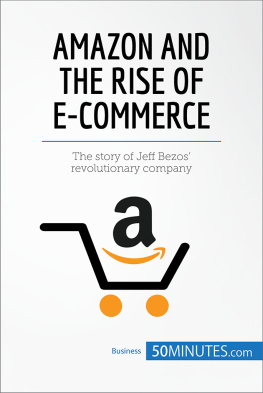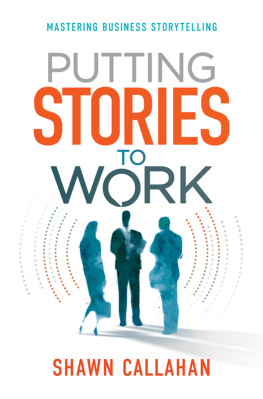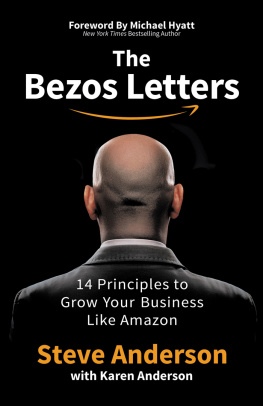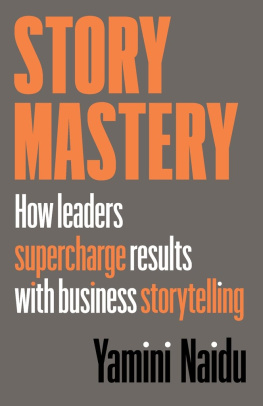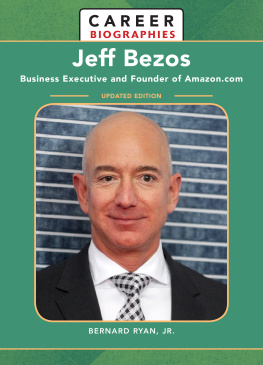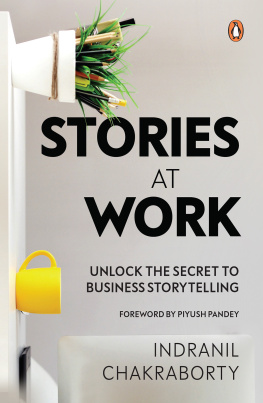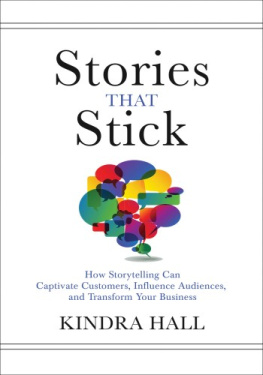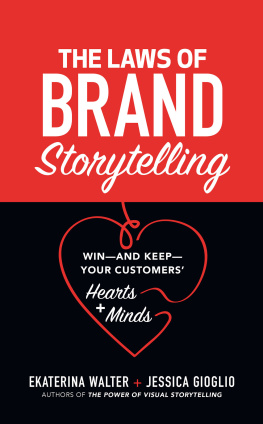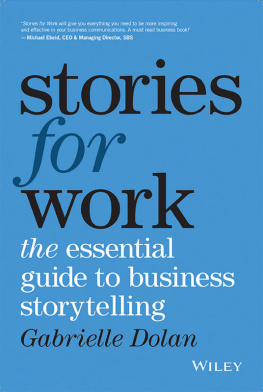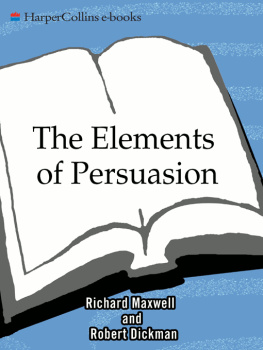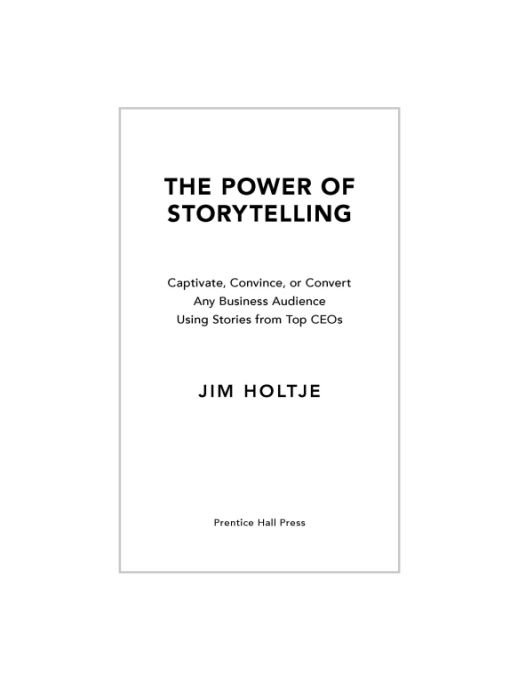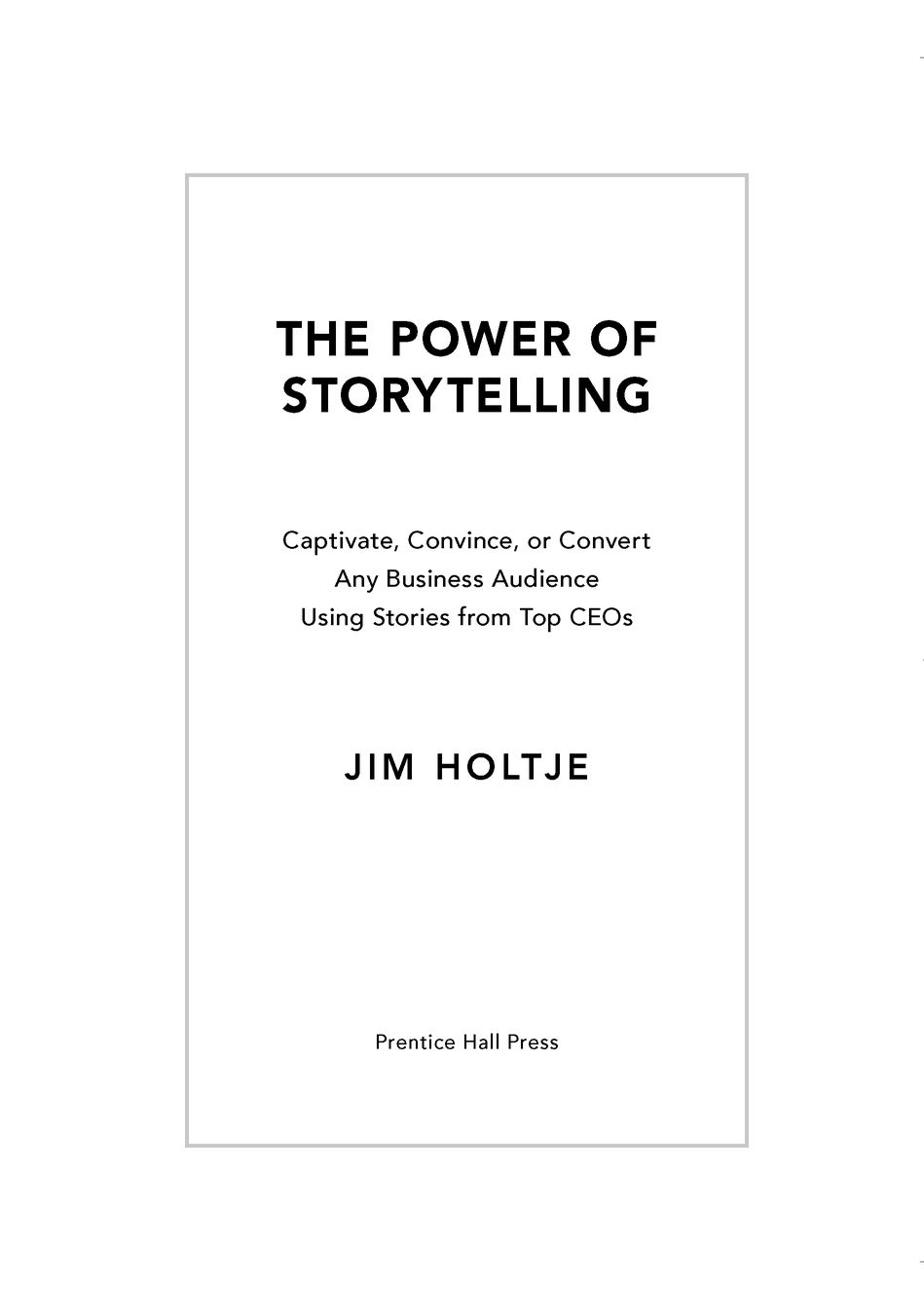Table of Contents
This is the strategic playbook for todays leaders who must use the power of story to inspire and lead greatly.
David Morey, vice chairman of Core Strategy Group and
award-winning author of The Underdog Advantage
Thanks to Jim for an indispensable resource for leaders who aim to make a lasting impact with their words.
Dana Rubin, director of New York Speechwriters Roundtable
When I picked up the book, I looked first for stories of CEOs I know or feel I know. The stories ring true, as does Jims expert advice on putting the stories to use.
Frank Ovaitt, president and CEO of Institute for Public Relations
Executives who know how to tell effective business stories will influence audiences, motivate employees, and get good media attention. All executives need to master this communication skill. The wisest of executives will turn to this book to learn how.
Joan Detz, author of How to Write and Give a Speech
This book is a must for anyone who writes or delivers speeches. Jims techniques bring results that are instant and dramatic.
Virgil Scudder, CEO speech coach of Virgil Scudder & Associates Inc.
The Power of Storytelling is fresh, entertaining, and, most of all, useful. The anecdotes in this book demonstrate how stories can best be toldbut at the same time they also provide quick, powerful lessons in management, leadership, motivation, and human nature that can be put to practical use in any organization.
William M. Murray, president and COO of
Public Relations Society of America (PRSA)
Holtje understands that telling a good tale means delivering the satisfaction of authenticity and nothing builds more productive and more enduring business relationships than authenticity. This book is not only a little vault of anecdotal business gems, but also an arsenal of high-powered narrative artillery that every savvy businessperson should command. The book is a pleasure and a revelation.
Jack Griffin, author of How to Say It at Work, How to Say It for
First-Time Managers, and How to Say It: Be Indispensable at Work
Bravo, Jim Holtje, for reminding data-driven CEOs and communications professionals that a personal anecdote, a fable, a parable, or a case history well told is always more humanizing and powerfully persuasive than an eye-glazing recitation of facts.
Michael Morley, former president of Edelman International,
adjunct professor at NYU School of Continuing Professional Studies,
and author of The Global Corporate Brand Book
This book is dedicated to my wife, Karin.
Thanks for the best second act anyone could ever hope for.
Acknowledgments
I am indebted to several individuals who made this book possible. My father, Bert Holtjean accomplished author in his own rightwas the best sounding board I could have asked for when testing the idea for this book and at various stages throughout.
My literary agent, Ed Claflinnegotiator par excellencemade this book possible and was a truly helpful guide each step of the way.
My former boss, Jack Bergen, saw this books potential right away and was more than generous in providing advice and writing the foreword.
Another former boss, Frank Ovaitt, was equally invaluable in providing suggestions and coaching.
I am also deeply indebted to my wife, Karin. She patiently endured my writing during the early hours of the morning before I headed to work, at night when I returned home, and on more than a few lost weekends.
All were encouragement personified.
Finally, my thirteen-year old son, Mark Holtje, who has already shown a strong interest in writing. I hope the family tradition continues.
Preface
The Power of Storytelling is designed to help you improve your business communications with ready-to-use stories and anecdotes. They can be used to complement your own stories, or in place of them. Either way, its meant to help make your writing more compelling, more engaging, and more memorable by using one of the most time-tested arts available to any communicatorstorytelling.
The book itself was borne of frustration. Not frustration with my professionI love being a speechwriter and corporate communicatorbut frustration with the lack of tools to help me do my job.
About two years ago, on a chilly Saturday afternoon in March, my wife and I were outside the Strand Bookstore on the corner of Broadway and 12th Street in New York Citya stones throw from Union Square. For those not familiar, the Strand is a venerable New York institution boasting 18 Miles of Books, including a second-to-none selection of hard-to-find works. If bibliophiles were granted a taste of heaven on earth, this just might be it.
Weve long had a weekend ritual of bargain hunting at the Strands $1 remainder shelves outdoors. After peering down row after row of gently used hardcovers on this March Saturday, my eye was caught by one book in particular: the autobiography of an especially iconic CEO. I dipped in and read a few pagesand then some more. Page after page, what struck me were the stories. One more colorful and telling than the one before. The experience triggered a memory.
I thought back to a job Id held not long before, as the English-language speechwriter for the CEO and president of Siemens AG, in Munich. One of my colleagues, an American who had settled in Europe and was writing speeches for the previous CEO at the time, once asked me if he could borrow some of the books I had brought from the United States when starting my three-year assignment. After much perusing, he thanked me politely, said the books were fine, but they were mostly quotations. He needed something different. He was looking for anecdotes, storiesparticularly with a business slant. I had encountered exactly the same frustration in my own work. There are lots of quotation books out there, but not much when it comes to storytelling. And theres almost nothing when it comes to business storytelling.
That momentstanding at the corner of Broadway and 12th Street on that brisk Saturday morningwas my eureka moment. Wait a minute... Why not retell some of the best business stories right from the sourcefrom autobiographies and biographiesand then collect them in a reference book for others to use? Instead of adding a quote or two in a speech, which might get a passing nod, why not add a story that will keep your audiences undivided attention?
I paid the princely sum of $1 for the autobiography, went home, and started putting ideas on paper. Thats how this book was born.
Its my hope that it will be a constant companion and well-thumbed reference not just for speechwriters, but for anyone interested in communications as well as business in general. I hope its added to your permanent collection. But I also hope it doesnt gather dust. Its meant to be used as a trusted source for ideas, a spark of creativity, a means for shifting your perspective, or, hopefully, a cure for the bane of all communicators: writers block. Whatever the circumstance, its designed to be


